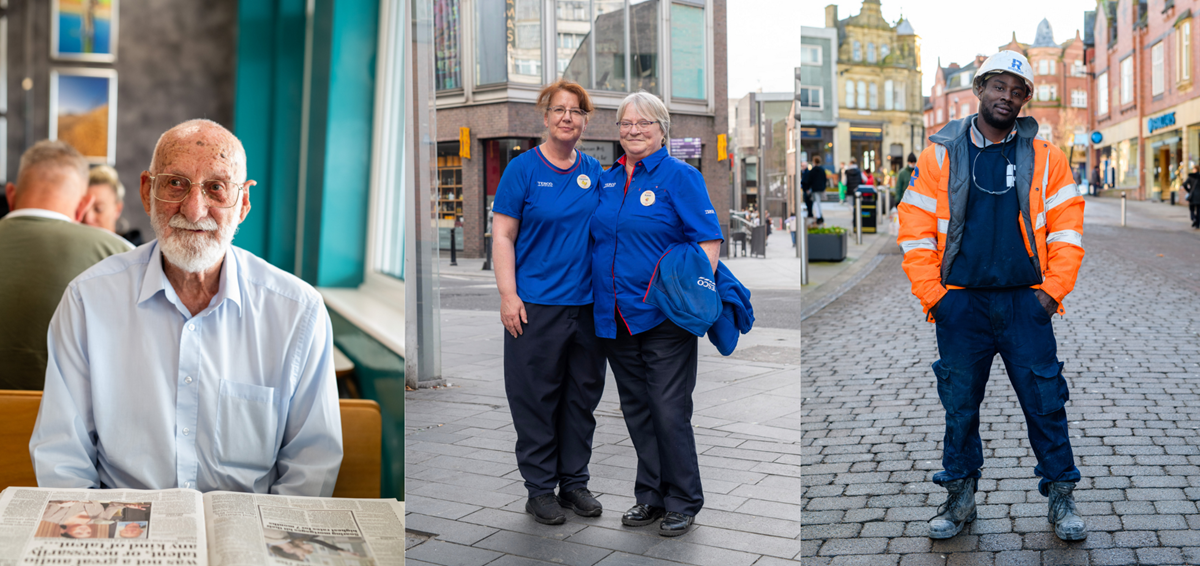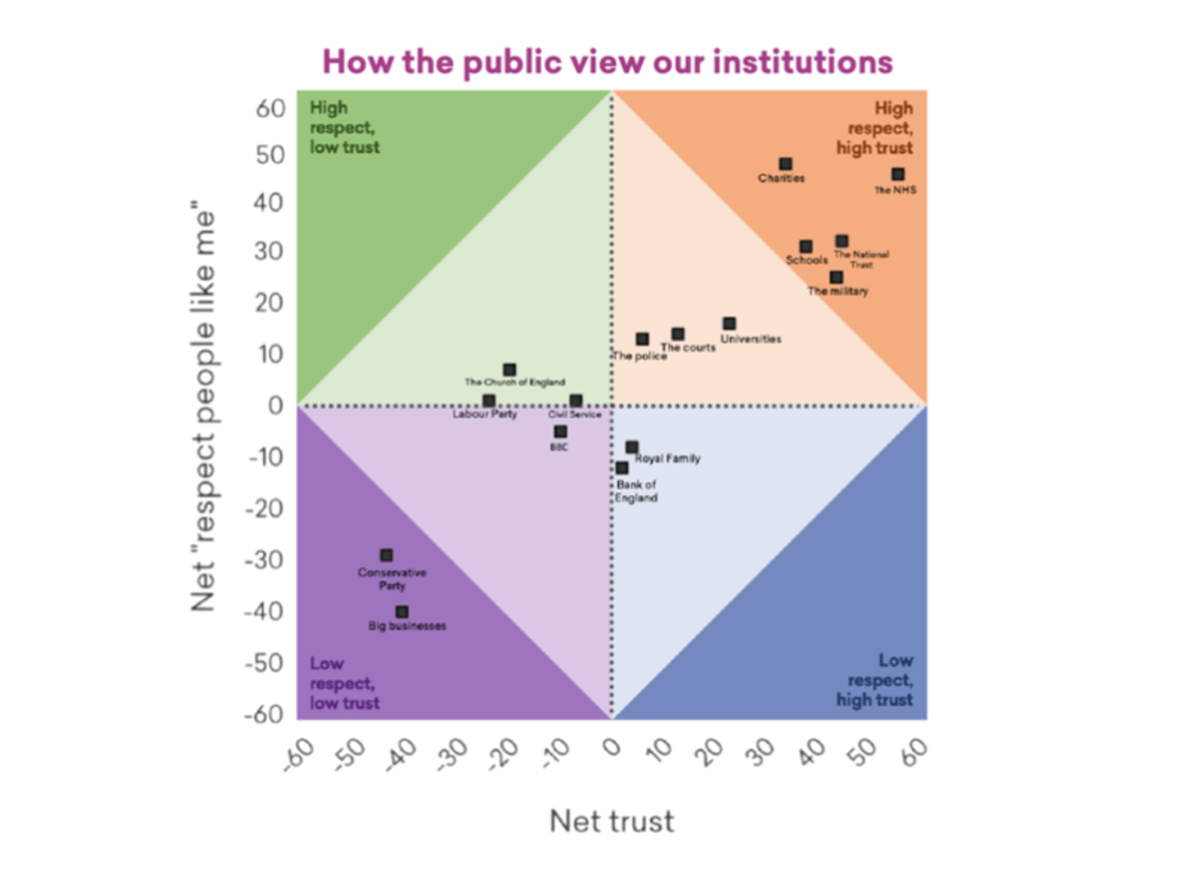New research from More in Common and the UCL Policy Lab finds that the public are crying out for more respect from their political leaders and many of our key national institutions.

Based on polling of 4,000 people and in-depth focus groups across the country, the ‘Respect Agenda’ report reveals that millions of Britons do not feel they get the respect they deserve and want a ‘respect reset’ with their political leaders and many of Britain’s national institutions – which changes the way our democracy works and starts to mend ‘Broken Britain’.
The public think that tackling this deep-seated malaise will involve more than just money. The public see underfunding of public services as just one of many reasons why the country doesn’t work as well as it should – and think that a failure to listen to ordinary people is part of the problem as well. Rebuilding hope, restoring faith in politics and convincing people that institutions of the state are working for the common good will require a new approach.
The public value respect more than any other attribute in their leaders
That new approach is at once simpler and more difficult than spending more on public services. What the public most want from politicians, public servants and decision makers is to feel respected.
Instead of people being respected for what they contribute, Britons think respect has become synonymous with having a degree and having wealth. They want that to change. Britons think that lawyers, academics, doctors, CEOs get respect, while farmers, teachers, care workers, retail workers and factory workers don't get the respect they deserve. The public wants to see greater recognition from those in power of the vital role that those in blue-collar jobs and key workers perform in keeping our country and their community going. The public find the misallocation of respect in Britain today particularly galling because it ignores the fact that there are very many people in non-graduate or lower paid jobs, without whom the country would simply stop functioning. Yet that contribution is too often being taken for granted.
The public believe ‘showing respect for ordinary people’ is the most important attribute a political leader should have. Showing respect trumps political experience, understanding of business, the desire for fresh ideas, and even the ability to get things done as important attributes for politicians. Britons feel that unless those in power properly respect the people they serve, they cannot be expected to deliver on the public’s priorities.
The voters who will be key to the next election result place an even higher premium on respect. Loyal Nationals and Conservative switchers (those who voted Conservative in 2019 and would now vote Labour or don’t know who they will vote for) score respect more highly than average as an attribute they think is important in a political leader. This means there is the potential for a significant electoral prize for the political party that chooses to embrace an agenda of respect.
Politicians have an opportunity to own an agenda of respect
Feeling respected by a politician is not simply a proxy for whether people like or dislike that politician. Nor is respect the same as trust in politicians. Instead, being respected involves being seen, heard and acknowledged by those in positions of power. The good news is that being able to demonstrate that politicians and political parties respect ordinary people is both more achievable in the short-term than tackling distrust, and itself a potential first step to addressing that deeper issue of public distrust.
Neither political party currently excels on the question of whether they respect ordinary people but there are differences between them:
- The Conservative Party has a net score of minus 39 per cent on the question of whether the party respects people like them.
- The Labour Party net-respect rating sits at just one per cent – though this is significantly higher than the trust scores for the party and 40 points higher than the Conservative respect score.
Given the importance the public place on being respected, these low scores are something both parties need to address - to either own a ‘respect agenda’, or at very least mitigate their weaknesses heading into the next General Election. If the Conservatives are to get a second hearing from the electorate, their focus has to be on mitigating the perception that they do not respect ordinary people. The Labour Party, on the other hand, has a chance to positively own a ‘respect agenda’ that is popular with and matters for the public.
Leaders can demonstrate respect by recognising contribution, demonstrating empathy and behaving honestly and authentically
The public see showing respect to them as involving four things:
- Contribution - The public want to see respect being offered on the basis of an individual’s contribution to society rather than their social status or education level. That means showing more respect to those who work hard, play by the rules and contribute to their community and a greater recognition that success comes in different forms.
- Empathy - Leaders who can empathise with the experiences of ordinary people are more likely to be able to show respect to ordinary people too. In focus groups, Britons bemoan the decline in politicians who come from ordinary backgrounds and say they would feel more respected by politicians who understand their everyday struggles.
- Authenticity - For Britons ‘being yourself’ is a sign of respect. The leaders that the public identify as respecting ordinary people are those who show their true self when in public and don’t try to pretend to be something they are not.
- Honesty - The public do not want to be patronised by politicians who assume the public are incapable of understanding the country faces tough choices. Instead, Britons want politicians who level with the public, and are honest about the challenges Britain faces.
A respect manifesto would be rooted in the day-to-day concerns of ordinary people
Demonstrating respect goes beyond the values and experiences of politicians, it forms the basis for a series of policies that people most want to see politicians introduce. What connects all these policies is that they are grounded in everyday ordinary concerns about family and community life. The public are not asking for grand political abstract visions, but instead see respect as linked to a series of tangible improvements to their everyday.
The most popular options when asked to select from a list of potential policy announcements that would demonstrate respect are: making it easier to get a GP appointment (49 per cent), followed by increasing the minimum wage (39 per cent), abolishing the BBC licence fee (36 per cent), increasing public sector pay for nurses, teachers and carers (35 per cent), building more affordable homes (35 per cent) and cracking down on criminals (32 per cent).
Respect means recognising that local communities know best how to improve their neighbourhoods and empowering them to do so
Respect isn’t just about acknowledgement but agency too. People are more likely to feel respected when they are able to share their ideas about how things might get better and to play their part in mending ‘Broken Britain’ from the bottom up. Central to demonstrating respect is the extent to which traditional decision makers are willing to give up some power and trust local people and community groups to make decisions about, and own the future of, their local area.
More than seven in ten Britons feel that local and national governments do not give residents and community groups the freedom to bring about improvements to their local area. Unleashing community agency then must be central to a public respect agenda. To do that, a new politics of respect needs to do three things: it needs to support local groups and institutions to collaborate with traditional decision makers to bring about change, to engage and empower the people and organisations who are pillars of communities and to build up local spaces where the public mix and meet together.
Institutions can show respect people by delivering for, listening to and involving the public
The crisis of trust in and lack of respect from politicians is not limited to the political arena. Many of Britain’s key national institutions face challenges of low or mediocre levels of public trust and many also feel that these institutions do not respect them. Quadrant analysis of the British public’s trust and respect for institutions helps to understand how the public view our national and local institutions.

Six clusters emerge from high-trust-high-respect institutions to low-trust-low-respect institutions. Different strategies are needed for each to retain or regain public confidence.
- High Trust-High Respect institutions such as the National Trust and the NHS – the focus should be avoiding complacency, doing more of the same and helping other organisations to do so.
- Medium-high trust/respect institutions such as Universities and the Police – to secure their public standing these organisations need to do better jobs at showing they value those who look and think differently to themselves.
- Medium respect/low trust such as the Civil Service and the Labour Party need to focus on the material improvements they can make to people’s lives and communities across the countries.
- Low respect/high trust such as the Royal Family and the Bank of England need to find ways to demonstrate they can relate to the challenges faced by ordinary people up and down the country. Part of that means a more accessible monarchy.
- Medium-low respect/medium-low trust such as the BBC should focus on practical steps to rebuild trust rather than constantly trying to respond to elite debates about ideological bias.
- Low respect/low trust such as big businesses need to win public confidence back. That requires businesses upholding their side of the social contract - not only adopting global corporate responsibility campaigns but also getting the basics right - treating their employees well and their customers fairly.
The overarching lesson for how institutions can show they respect the public is to do the job they’re meant to do, genuinely listen, and engage with people’s concerns and eliminate a ‘computer says no’ mentality. In this way, rebuilding trust and respect involves practical and visible steps rather than responding to highly elite cultural or ideological debates. An approach of both show and tell is needed to regain public confidence.
As the countdown to next year’s General Election begins in earnest voters are clear what they most want to see and hear from politicians – an agenda of respect. The public think that for too long those in power have offered respect based on the size of someone’s bank balance or the number of letters after their name rather than on how they contribute to our country and their local communities. They want that to change. Our findings in this research leave us in no doubt that the party that can demonstrate that it will show respect to ordinary people is in line for a significant electoral prize.
Luke Tryl, UK Director, More in Common
“For too many years we have talked about ‘left behind communities’ and the need to ‘level up.’ Now we discover millions of people across the country feel that they are not given the respect they deserve, by their politicians or many of their key institutions. It is time for this to change and for leaders of all kinds to work together to build a future that respects the potential contribution of us all.”
Marc Stears, Director, UCL Policy Lab